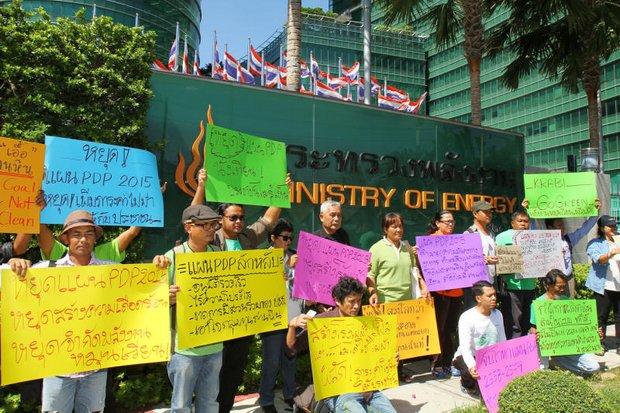Activists protest outside the Energy Ministry against a state power development plan which includes a proposal to build more coal-fired power plants. They have criticised the plan over a lack of public participation. (Photo by Tawatchai Kemgumnerd)
The government’s Power Development Plan 2015 (PDP 2015) stands to affect people unfairly, critics say.
A group of 25 activists and local people from around the country demanded Monday that the government revoke it and start again. It wants Prime Minister Prayut Chan-o-cha and the Energy Ministry to come up with a new plan based on public participation and transparency.
They also urged the government to give priority to renewable energy. The PDP 2015 limits renewable energy capacity to 20% of overall supply. They said there should be no limit on renewable energy capacity.
The group, consisting of locals and representatives from 18 networks affected by proposals under the plan to develop coal-fired power plants and the Salween and Mekong dams, handed a complaint letter to the ministry.
The plan exaggerates the extent of future power demand and makes allowance for excessive power reserves, they said. More power plants and dams would have to be built than are necessary according to more conservative estimates.
“Energy security is supposed to improve the well-being and quality of life of the people while maintaining natural resources,” said Isdares Hayeeda, deputy mayor of Thepha district municipality where a 2,200-megawatt coal-fired power plant is planned.
He said the PDP failed to deliver in these areas. Instead, it focuses on building large power plants to support unreasonable predictions of increased power demand.
The PDP will determine power supply sources from 2015 to 2036. Under the plan, coal and hydropower will be the main sources of power, with the former increasing from below 10% to 25% and the latter from 7% to 20% of overall power supply.
According to the PDP, the country’s power reserves will be maintained at over 15%, the standard in many countries, or between 10,214-18,099 megawatts. The reserves are valued at about 670 billion baht. The plans says reserves could reach up to 39% in some years.
Over the next 20 years, a number of power plants with a capacity of 24,736 megawatts will reach the end of their lives, according to the PDP. Academics have suggested these plants could be upgraded, which could help prevent conflicts with locals in locations where new plants are planned.
“Consumers will have to suffer the burden [of the investments] even though they don’t really benefit from these power plants,” said Toahet Klongyuan, a local villager from Krabi, a province targeted for an 800-megawatt coal-fired power plant. The huge projects would benefit industry rather than household users, he added.
Mr Toahet said the locals asked why the Electricity Generating Authority of Thailand rushed the Krabi coal-fired power plant bid despite its environmental impact assessment being under study.
The group also raised concerns about the trans-boundary impacts of dams on the Mekong and Salween rivers as well as coal-fired power plants in neighbouring countries.
The controversial Xayaburi dam is under construction in Laos. About 95% of the power generated by the dam will be imported by Thailand.
Source: http://www.bangkokpost.com/news/general/684080/activists-urge-govt-to-scrap-energy-plan



